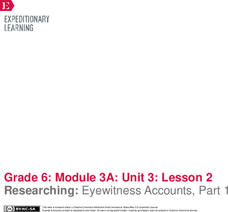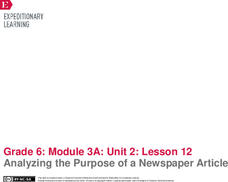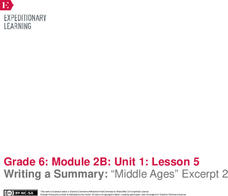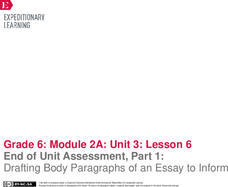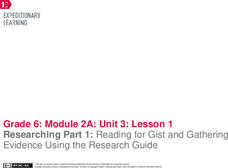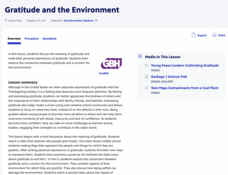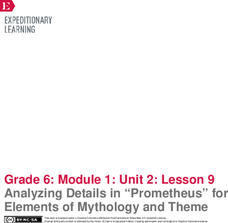EngageNY
Introduction: The Ideas of Charles Darwin
Piece by piece ... Scholars read the text World without Fish by breaking the text into pieces. They identify challenging words and determine the gist of each section as they read. They then work together in triads to answer...
EngageNY
Researching: Eyewitness Accounts, Part 2
Continue on. Learners continue with the work they began in the last lesson looking for quotes to complete an eye witness interview. Pupils work in their groups to examine the texts in their research folders and The Great Earthquake and...
EngageNY
Reading for Gist and Answering Text-Dependent Questions: Chapter 4 of World without Fish
True or false? Scholars read chapter four of World without Fish and explore the idea of a myth. They discuss in triads the meaning of the myth of nature’s bounty. Learners annotate the text on sticky notes and then answer text-dependent...
EngageNY
Mid-Unit Assessment: Analyzing Idea Development in Chapter 3 of World without Fish
Half way there. Scholars work on the mid unit assessment for World without Fish. Learners work independently to complete the assessment. They then answer text-dependent questions and use sticky notes for annotating.
EngageNY
Tracing the Idea of Fish Depletion: Chapter 1
Would you, could you? Scholars read World without Fish and focus carefully on the use of the words could and would. They chunk the text into smaller sections and write annotations on sticky notes to help with comprehension. To finish,...
EngageNY
Introducing the Struggle for Survival in the Introduction of World without Fish
No fish? Catch a word. Scholars read World without Fish and record unfamiliar vocabulary in their word catchers. They discuss word meanings as well as root words. They answer text-dependent questions before discussing the importance of...
EngageNY
Researching: Eyewitness Accounts, Part 1
Time to go on a quote hunt! Because learners cannot interview real eye witnesses for their newspaper articles, they read through text The Great Earthquake and Fires of 1906 looking for quotes to answer their questions. Learners complete...
EngageNY
Analyzing the Purpose of a Newspaper Article
Shh! No talking during the discussion! Using the resource, scholars engage in a silent discussion called a Chalk Talk activity to analyze the purpose of a newspaper article. Additionally, they read a model newspaper article and try to...
J. Paul Getty Trust
Exhibiting Common Threads
Artists working in different media often explore the same themes—to model how these same themes weave their way through different forms of artistic expression, scholars analyze images by Dorothea Lange, identifying key themes in her...
EngageNY
Mid-Unit 3 Assessments, Part 2: Summarizing, Analyzing and Discussing Research
Why is reading important? As part of the mid-unit assessment, scholars read, summarize, and analyze an article about the importance of reading. Additionally, they continue their discussion about whether their rules to live by should be a...
EngageNY
Mid-Unit Assessment: Research
Middle assessment for the Middle Ages. Scholars complete a mid-unit assessment by reading and answering questions about three different text pertaining to the Middle Ages. Learners work independently on the assessment for the class period.
EngageNY
Writing a Summary: “Middle Ages” Excerpt 2
What is the big idea? Scholars use Middle Ages Excerpt 2 to complete a summary graphic organizer. They then use the information from the organizer to write a summary of the text on lined paper. Learners share summaries with the class.
EngageNY
Writing a Summary: “Middle Ages” Excerpt 1
What's this all about? Scholars learn the importance of summarizing skills using a summary writing graphic organizer. They work with an elbow partner to discuss summaries and complete the organizer using Middle Ages Excerpt 1. Learners...
EngageNY
End of Unit Assessment, Part 1: Drafting Body Paragraphs of an Essay to Inform
Anybody can write a body paragraph! Pupils analyze the development of ideas in a body paragraph from a model essay. Next, using what they've learned, they draft the body paragraphs of their My Rule to Live By informative essay.
EngageNY
Mid-Unit 3 Assessments, Part 1: Summarizing, Analyzing and Discussing Research
Speak up and listen up. Scholars participate in a speaking and listening mid-unit oral assessment. They discuss whether their rules to live by should be a personal choice or made into a law, and then they complete an exit ticket to...
EngageNY
Researching Part 2: Reading for Gist and Gathering Evidence Using the Researcher’s Notebook
The gist should be short and sweet! Pupils practice finding the gist of an informational text and then write a summary of the text. Next, they gather with their research teams to discuss a focus question based on the novel Bud, Not Buddy...
EngageNY
Researching Part 1: Reading for Gist and Gathering Evidence Using the Research Guide
If only life came with an owner's manual. Pupils assemble with their research teams to discuss which of Steve Jobs' rules to live by most resonates with them. Scholars also read informational texts in pursuit of finding the gist and...
Benjamin Franklin Tercentenary
Let’s Throw an Electric Science Party!
Are you looking for a shockingly good lesson? Check out one that has middle schoolers recreate four of Benjamin Franklin's experiments. Groups investigate, observe, and draw conclusions about static electricity and electrical current....
PBS
Gratitude and the Environment
A class discussion begins a two-part lesson plan about gratitude and the environment. In part one, learners watch a video then share their feelings about its most memorable moment. Delving deep into the meaning of gratitude, scholars...
EngageNY
Analyzing Details in “Prometheus” for Elements of Mythology and Theme
Well isn't that clever? Scholars read Prometheus, a tale describes the clever Greek god and trickster. They tune into details and complete graphic organizers that reveal the theme of the text.
EngageNY
Connecting Literary and Informational Texts: Cronus and “The Key Elements of Mythology”
Is there a connection? Scholars work to make connections between Myth of Cronus and The Key Elements of Mythology. First, they circle important words in the text and look for similarities. They then revisit the concept of theme and...
EngageNY
Reading Closely to Build Background Knowledge: “Myths and Legends”
That is a myth! Scholars take a look at Greek myths referenced in The Lightning Thief. As learners listen to stories in Myths and Legends, they imagine the sights and sounds described. Pupils then talk with partners about specific words...
EngageNY
Building Background Knowledge About the Hero’s Journey, Part 2: Acts 2 and 3 Plus Focusing on Key Vocabulary in “The Hero’s Journey”
It's all in the details. Scholars read acts two and three of The Hero's Journey and collect important details from the text. They share their notes with their peers and listen for key words from the story. They then turn their attention...
EngageNY
The Hero’s Journey, Part 1: What is a Hero?
That was heroic! Scholars quickly look over What is a Hero to determine and discuss the structure of the text. They then read the introduction and Act 1 closely to find the gist and annotate the text. They circle unfamiliar words and...








